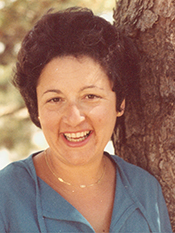Read into the Congressional Record by Representative Marcy Kaptur on May 26, 2016.
 “Mr. Speaker. I rise today to remember the life of Susan J. Tolchin, someone whom I had the privilege to work with and who I had long admired for her curiosity, her judgment, and her concern for others.
“Mr. Speaker. I rise today to remember the life of Susan J. Tolchin, someone whom I had the privilege to work with and who I had long admired for her curiosity, her judgment, and her concern for others.
“An ardent feminist, who along with her husband, Marty, brought attention to the plight of middle-class working women, a class of Americans often overlooked and rarely chronicled. Susan and Marty authored several books together, all of which highlighted the mechanisms that the Tolchin's considered ‘occupational hazards of democracy.’
“As an author and a professor, Susan focused on and scrutinized political patronage and its many pitfalls, and was one of the first political scientists to identify growing voter disenchantment and disillusion with their government. She wisely concluded that these concerns were deeply rooted in the women’s and workers’ rights issues, largely discounted and ignored by policymakers, but which she sought to highlight through her teaching and writings.
“In her seminal and sage work on political patronage, Susan redefined political patronage as that which ‘includes the vast range of favors awarded by constantly expanding governments.’ Likewise, her work on evolving voter anger was cutting-edge analysis, far ahead of her peers.
“For those who had the fortune to know her, Susan was an engaging and charming conversationalist, with a natural curiosity and ability to learn from others. She was always learning and seeking new ideas, and applying this knowledge to her scholarship in the classroom and in her writings in political journals, magazines and books.
“Susan’s legacy of scholarship has provided those of us who also champion women’s and laborers’ rights with a critical knowledge base. Her work was inspirational, and insightful, and helped me and many others to understand trends and the undercurrents that caused them which others might have missed.
“Susan was not only dedicated to struggles of the working, middle-class women, but also to her family, whom she loved dearly. She and her husband, Martin, worked closely together for many decades, authoring many books. She adored her daughter, Karen, also a professor, and their charming grandson, Charlie. The tragic loss of their son, Charles, from a series of health setbacks in 2003 was a show of strength, love and compassion, how a supportive family rallies behind a son in need, with courage and resilience.
“They were quite a team, Susan and Marty, always joyful and supportive of each other, in the best of times and in challenging times.
“Those who were fortunate to have known and loved Susan, or who had followed her work, will miss her terribly. Her passion was an inspiration for many, and one can only hope that her passing will not be the last chapter of her story, but that she will continue to inspire countless others. She certainly inspired me.
(Tolchin lived in Warren and Washington, DC.)






